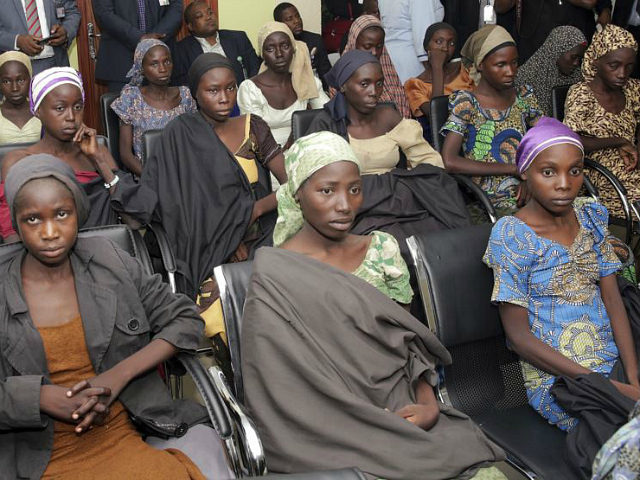The Islamic State affiliate Boko Haram reportedly released a video Monday showing some of the women and girls of the hundreds abducted from Chibok, Nigeria, in 2014, all asserting they would never return to their normal lives.
Boko Haram terrorists raided the northeast town of Chibok in April 2014 and kidnapped 275 girls taking a final examination at the local school, turning them into sex slaves, suicide bombers, and maids. While the Nigerian government has succeeded in releasing a small number, and some have escaped on their own, most remain in captivity. Officials believe terrorists are hiding the girls in the Sambisa Forest of Borno state, where the terrorist group was founded.
The 22-minute video shows 14 girls and women, all in hijab and some in full niqab, vowing their loyalty to the terrorist group. According to Nigeria’s Daily Post, a journalist with the online platform Sahara Reporters obtained the video.
“This is a message to our parents in Nigeria, they should repent and bow to Boko Haram, we won’t come back,” one girl tells the camera.
“We are the Chibok girls. … By the grace of Allah, we will not return to you,” the girl says:
BREAKING: Boko Haram releases videos showing some of the remaining Chibok girls who they claimed vowed not to go back to their parents #BringBackOurGirls
Videos obtained via Ahmad Salkida, a journalist that specializes on reporting the conflict in the Lake Chad region pic.twitter.com/5x9xwE1FzF— Sahara Reporters (@SaharaReporters) January 15, 2018
AFP reports that the entire video also includes assurances from the girl speaking that they are living well. “We live in comfort. He provides us with everything. We lack nothing,” the girl says, referring to Boko Haram leader Abubakar Shekau. Some of the girls in the videos are holding infants believed to have been conceived in captivity, the product of rape by their captors. Among Boko Haram’s most popular strategies to terrorize is to abduct girls en masse and “marry” them off to terrorists, impregnating them and ensuring a stable population of children to use in suicide attacks.
Shekau himself reportedly appears in the video, “firing a heavy machine gun and making a 13-minute-long sermon,” AFP notes.
The Nigerian government has repeatedly claimed it has killed Shekau, only to have a man claiming to be the jihadist leader resurface in new videos. Authorities have no way of confirming if the men appearing in videos following their claims of having killed Shekau are Shekau himself. A man claiming to be Shekau most recently released a New Year message in the beginning of January, stating, “We are in good health, and nothing has happened to us.”
The latest Shekau video surfaced shortly after Nigerian President Muhammadu Buhari affirmed, “We have since beaten Boko Haram.”
“Isolated attacks still occur, but even the best-policed countries cannot prevent determined criminals from committing terrible acts of terror,” Buhari said in a statement welcoming the new year. Buhari has repeatedly insisted that Boko Haram no longer presents a threat to the nation. In December 2015, he told the BBC that “technically, we have won the war” against the terrorist group. Yet terrorist attacks continued and, in a tacit admission that his claims of victory were false, the Nigerian government demanded $1 billion in military funding in December 2017 to fight Boko Haram.
Abuja’s request of the Senate appropriations leaders would cut Nigeria’s surplus oil profits in half. The Senate approved the proposal despite widespread opposition.
While Boko Haram remains a threat in spite of assurances from Buhari, the Nigerian military claims that the number of Nigerians suffering under jihadist captivity has fallen dramatically. Two weeks ago, the military announced that “over 700 farmers, fishermen and members of their families” escaped Boko Haram recently, the result of a barrage of military action against Boko Haram terrorists.
“The ensuing collapse of their command structure and means of survival have therefore triggered the abandonment of the islands and escape of the abductees,” Nigerian army Deputy Director of Public Relations Col. Timothy Antigha explained.
The Nigerian government places escaped Boko Haram captives in programs to reintegrate into society as many, especially children, exhibit signs of brainwashing and can present a threat to their communities. The escaped Chibok girls have presented particular concerns for the government, given the extended amount of time many of these spent under Boko Haram control, forced to study jihadist scripts and taught to serve their “husbands.”
Even in cases where the government manages to find and free the girls, they may face opposition from the captives themselves. A group of nearly 100 Chibok girls rescued in October 2016 initially refused to go with the soldiers who found them. While some suggested a form of Stockholm syndrome as the reason for their refusal, Pogu Bitrus, chairman of the Chibok Development Association, said at the time that the girls “were ashamed to return home because they were forced to marry extremists and have their babies.” Some Boko Haram captives have faced rejection in their communities after escaping the group.
Those who return willingly must often wait weeks to return to their parents and loved ones after the military rescues them. Following the rescue of 82 Chibok girls in May 2017, for example, the government sent the former captives to a nearby town for physical and mental health evaluations, triggering concern from parents, who had waited years to reunite with their daughters.

COMMENTS
Please let us know if you're having issues with commenting.